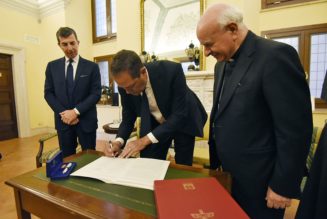By Dr. Jeff Mirus ( bio – articles – email ) | Dec 22, 2023
Note at 9:10 pm EST 12/22/2023: Given the rapidity with which opposition by bishops around the world had grown to the new instruction on blessings for same-sex couples since I first began working on this article on Thursday the 21st, and even since I initially posted it earlier in the afternoon today, I found it necessary to make some revisions and repost it.
In the interval not only did I become aware of the increasing worldwide resistance but I learned that the notorious Fr. James Martin, SJ had already made a photo-op out of the new instruction by arranging to bless a gay couple for the benefit of a photographer for the New York Times.
This pro-LGBTQ+ posturing was, of course, predictable. But I did not anticipate such widespread and salutary opposition among the world’s bishops, which raises important questions (as yet unanswered) about how the Pope will respond.
After writing my assessment on Monday of the new DDF text on blessings, Fiducia Supplicans, I’ve spent some time following the reactions. Nobody will be surprised that a few bishops have celebrated the DDF statement as, in effect, making the sky the limit, along with other LGBTQ+ advocates. That is not what the text says, but all serious observers expect it to precipitate precisely this sort of result. After all, human understanding is always contextual. One of our intellectual capacities is the ability to read between the lines.
We could, of course, reverse the old joke by asking: What part of “Yes” do we not understand? This is all the more tempting when the text itself states explicitly that the Holy See does not want to be bothered further about this question, nor does it want bishops or even episcopal conferences to establish particular liturgical or paraliturgical forms for such blessings. Pope Francis wants priestly blessings to be a matter of pastoral accompaniment in each situation. Such blessings, the text makes very clear, are to be personal, pastoral and situationally appropriate invocations of God. It warns that these are not to be formalized in any sort of published guidelines.
As I have already indicated, there are dangers to this “hands off” policy, which potentially gives free rein to those committed to the LGBTQ+ ideology. Here we have a policy that, at least in the current dominant cultural context of the West, cries out for abuse. Nonetheless, it is true that, in the DDF text, Pope Francis has approved important distinctions about the nature of personal blessings, and recognizes that they can be appropriate even for same-sex couples in non-celebratory settings. One example given was during pilgrimages; another was in meetings with a priest (e.g., in priestly counseling).
Such counseling situations are in fact fairly common already for male-female couples cohabiting romantically without benefit of Christian marriage. When these continue to attend Mass, and especially when they engage in ongoing discussions with a good priest, they are often struggling toward a spiritual and moral clarity which will enable them either to regularize their situation, live together as brother and sister, or separate. A priest may well bless such “couples” during a counseling session (e.g., “May you continue to seek to understand God’s will, may He strengthen you in faith, hope and love, and may Almighty God bless you now and always, in the name of the Father, and of the Son, and of the Holy Spirit, Amen”). This would be appropriate to the situation.
The same would therefore be true for same-sex “couples” struggling in similar ways, though their options will often be fewer (in other words, this is not a problem that an annulment can solve, so at least we do not need to argue about the ease with which annulments are often obtained). My point is simply that, whatever we may reasonably judge to be the likely impact of the new instruction, we ought not to claim to have understood the text of Fiducia Supplicans while remaining blind to these perfectly legitimate possibilities.
Episcopal responsibility
Therefore, I was initially surprised by the early bishops who had flatly refused to allow any implementation of the document in their dioceses (such as those in Kazakhstan and in Zambia). Given the likely (but incorrect-by-the-letter) use of the document to promote evil, one understands this reaction, but my first thought was that isolated defiance might miss an important opportunity. It would miss the opportunity for each bishop, while remaining in communion with Rome, to guide his own diocese as a true spiritual father. The Church needs bishops who are proactive in caring for their dioceses—in which they too are vicars of Christ—without disobeying the Pope. The devil, we like to say, is in the details. But it is perfectly possible to implement the new instruction in a manner which prioritizes the good of souls, and the most important task of a bishop is to be a good bishop, while still remaining in communion with the Holy Father.
This first response was in the context of my best guess that, once again, the there would be only a few bishops who cried foul. But that gradually proved not to be the case. Not only have quite a few individual bishops protested the new instruction, but essentially the entire continent of Africa—mainfestly the continent in which the Church is strongest and most vibrant—is in open opposition. See, for example, this news story: Leading African prelate plans continental ‘synodal pronouncement’ on new Vatican document. So it is just possible, in this rare case, that the world’s bishops can apply enough pressure to Pope Francis to cause him to clarify his intentions, or modify his consistently damaging faux pastoral approach to just about everything, or even to provoke his resignation.
But if the oppositional bishops do not have sufficient influence to effect changes at the top, a different strategy lies open to each and every bishop which, for those who take advantage of it, would do their dioceses even more good. For with greater energy and engagement a bishop can use even instructions such as Fiducia supplicans for the good of his own diocese. What, after all, could be better than for each bishop to use this new instruction as an opportunity to provide additional guidance to his priests, and to insist that the entire relationship between priests, religious communities, parishes and those who suffer LGBTQ+ attractions must be addressed in accordance with a proper and faithful recognition of these new guidelines for blessings
In other words: No more specifically “gay friendly” parishes. No more pro-LGBTQ+ speakers and programs. No more Church steps painted in the colors of the rainbow. Or, in places in which a natural hostility to homosexuals runs high, no more physical and psychological abuse, no more refusal of understanding and help. Only quiet, personal, fruitful pastoral ministry by priests, religious, deacons and counselors who have sufficient genuine pastoral love for souls to uphold the doctrinal, moral and sacramental teachings of Christ and the Church.
There is nothing in the controversial instruction from the DDF that prevents each bishop from demanding true pastoral accompaniment for those open to it—or from doing his best to ensure that there is no false pastoral accompaniment at all. A pastor rescues the sheep from danger and leads them to safety. A proper pastoral accompaniment means that a priest may bless those who are not celebrating their defiance but instead are in some way attempting seriously to resolve it while continuing the practice of their Faith—without receiving Communion if they are unable to prepare themselves spiritually, and without even a whiff of campaigning for the LGBTQ+ lifestyle.
Like most of my readers, I am exhausted by a lifetime of awareness of the number of bishops who do not seek to root out the sins of the dominant culture in their dioceses, but I have also grown tired of those few bishops who have frequently engaged in various kinds of public posturing against Rome or against other bishops or in other bishops’ dioceses. What we are seeing now is on a much broader scale that may actually do some good, so perhaps there are some new possibilities. No matter what happens, however, it is the duty of each bishop to clean up his own diocese. Problems—even the problems caused by Vatican statements that sometimes signal more than they say—always present possibilities for each bishop to do a better job.
I admit that it is hard to shoot the messengers who insist that this new text will, practically speaking, do more harm than good. I am one of those messengers, and I would prefer not to be shot. But it is also hard to justify the exclusion of same-sex “couples” from all personal blessings (not that this is likely to have been done recently anywhere in the West). It is certainly possible to give a personal blessing to two pesons of the same sex who are in ongoing discussions with a priest who is genuinely attempting to assist them in recognizing their need for conversion and growth in spiritual maturity, such that they will eventually separate or live chastely as friends. The new instruction on blessings may be a camel’s nose. If so, that just means the drafters have been clever. But if they in fact have been clever in drafting a denotatively faithful text destined to have bad consequences, this means that great care must be taken to implement the text through diocesan policies of strict interpretation, sound pastoral guidance, and adequate ecclesiastical discipline—deliberately rejecting all immoral expectations.
Again, perhaps the worldwide episcopal groundswell of opposition will be sufficient to effect change, but it remains true that most of the damage is currently being done, and will be done ever more thoroughly, in dioceses led by bad bishops, or sometimes in pastoral situations overseen by members of decadent religious communities which the bishops cannot completely control, and very frequently in our nominally Catholic universities. So there may be exceptions even in a strong diocese and, if so, these need to be publicized. But no matter what the outcome of the current resistance to Fiducia supplicans, my message to each and every bishop would be this: Your responsibility is that there should not be a priest with faculties in your diocese who is unwilling to implement this instruction in a morally correct way, without using it as an ideological tool to further erode Catholic faith and morals.
Other significant issues
The biggest hurdle in the text may be a semantic problem that is difficult to control—the use of the term “couples”. While any two people of the same sex who are together can be called a couple of men or a couple of women, the term “same-sex couple” carries the strongest possible implication that they are engaged in an immoral sexual relationship. (Notice that this is not nearly as true when we refer to a boy or girl, or a man and woman, as a “couple”.) It is important for everyone to understand that the Church’s willingness to offer ministerial encouragement to “same-sex couples” who are struggling with the implications of that relationship does not (and should not in any particular instance) indicate an acceptance of the morality of “same-sex coupling”—or indeed of any sexual coupling outside of the natural and sacramental institution of marriage between one man and one woman. Frankly, when such acceptance is indicated (as we know it very frequently is) this is a serious betrayal of the “couple”, of the Church, and of Christ Himself.
Assuming the new instruction remains in force, a second significant hurdle, perhaps surprisingly, is the unfortunate side-effect of the text’s structured emphasis on the difference between the formal liturgical blessing in sacramental marriage and the non-liturgical nature of personal blessings. Here we are faced with a legitimate distinction in terms of the different types and purposes of various blessings, but the emphasis on the distinction between “liturgical” and “non-liturgical” (or personal) can too easily be used to suggest that while same-sex unions cannot rise to the level of Christian marriage, they can on their own non-marital terms be good, wholesome, and approved through blessings.
This is one of the insidious dangers in Fiducia Supplicans. The distinction between liturgical and personal blessings is quite legitimate. Both have their proper uses, yet they are not the same. But the distinction between marriage and same-sex unions (or, for that matter, any form of sexual congress outside of marriage) is not of that type. Only the first has a moral use—not the others. It was either great cleverness, or a certain dullness with respect to the relevant moral dangers, which led this document to be issued as a text describing not the problems of different forms of human coupling but the nature of blessings (“Fiducia Supplicans: On the Pastoral Meaning of Blessings”).
Clever or not, it would be a grave error to come away from this text with the idea that a liturgical blessing is to a personal blessing as the Sacrament of Matrimony is to same-sex coupling. I suppose that both Pope Francis and DDF Prefect Victor Fernandez are intelligent enough to be aware of this unfortunate danger of parallelism in the reception of the text. But an unfortunate danger of parallelism is not a specific teaching error.
Final warnings
Let me close on a cautionary note for all those who are growing frustrated by the current pontificate. I have witnessed some self-described “sound Catholics” falling into very rash judgment, to the effect that it is perfectly clear that Pope Francis does not believe some of the teachings of his own Church or that Pope Francis is deliberately undermining the Catholic Faith. Let me emphasize that none of us knows the state of Pope Francis’ soul. It is possible, of course, that when the pope is wrong about something or governs the Church badly, he may in fact be committed to evil and may in fact not believe everything the Church teaches. But he may also be personally confused or extraordinarily imprudent in his pastoral strategies—or even mistaken, easily led, a poor tactician, or a terrible administrator. It is also at least possible that he could sometimes be right where we are wrong.
Our Lord Himself has warned us that we are morally bound to keep all these possibilities in mind. With respect to judgments of the state of the souls of others, or of their personal motivations, we have been taught by Christ through the Church to “judge not lest you be judged”. In the gospels, both Matthew (7:1-5) and Luke (6:37-42) recount Our Lord’s caution at considerable length. Here I quote from Matthew:
“Judge not, that you be not judged. For with the judgment you pronounce you will be judged, and the measure you give will be the measure you get. Why do you see the speck that is in your brother’s eye, but do not notice the log that is in your own eye? Or how can you say to your brother, ‘Let me take the speck out of your eye,’ when there is the log in your own eye? You hypocrite, first take the log out of your own eye, and then you will see clearly to take the speck out of your brother’s eye.”
The Pontificate of Francis is extraordinarily frustrating. I do not believe we can avoid discussing the issues in the hope of minimizing the damage. But neither can we judge the souls of others. So let us keep our spiritual controversies clean. Nothing is worth falling into sin. Whenever we are guilty of rash judgment, Satan wins. And to the degree that Satan wins in us, we have actually reduced one more opportunity for effective episcopal leadership.
Sound Off! CatholicCulture.org supporters weigh in.
All comments are moderated. To lighten our editing burden, only current donors are allowed to Sound Off. If you are a current donor, log in to see the comment form; otherwise please support our work, and Sound Off!



![New Mexico Is Losing a Form of Spanish Spoken Nowhere Else on Earth [NYTimes Paywall]…](https://salvationprosperity.net/wp-content/uploads/2023/04/new-mexico-is-losing-a-form-of-spanish-spoken-nowhere-else-on-earth-nytimes-paywall-327x219.jpg)







